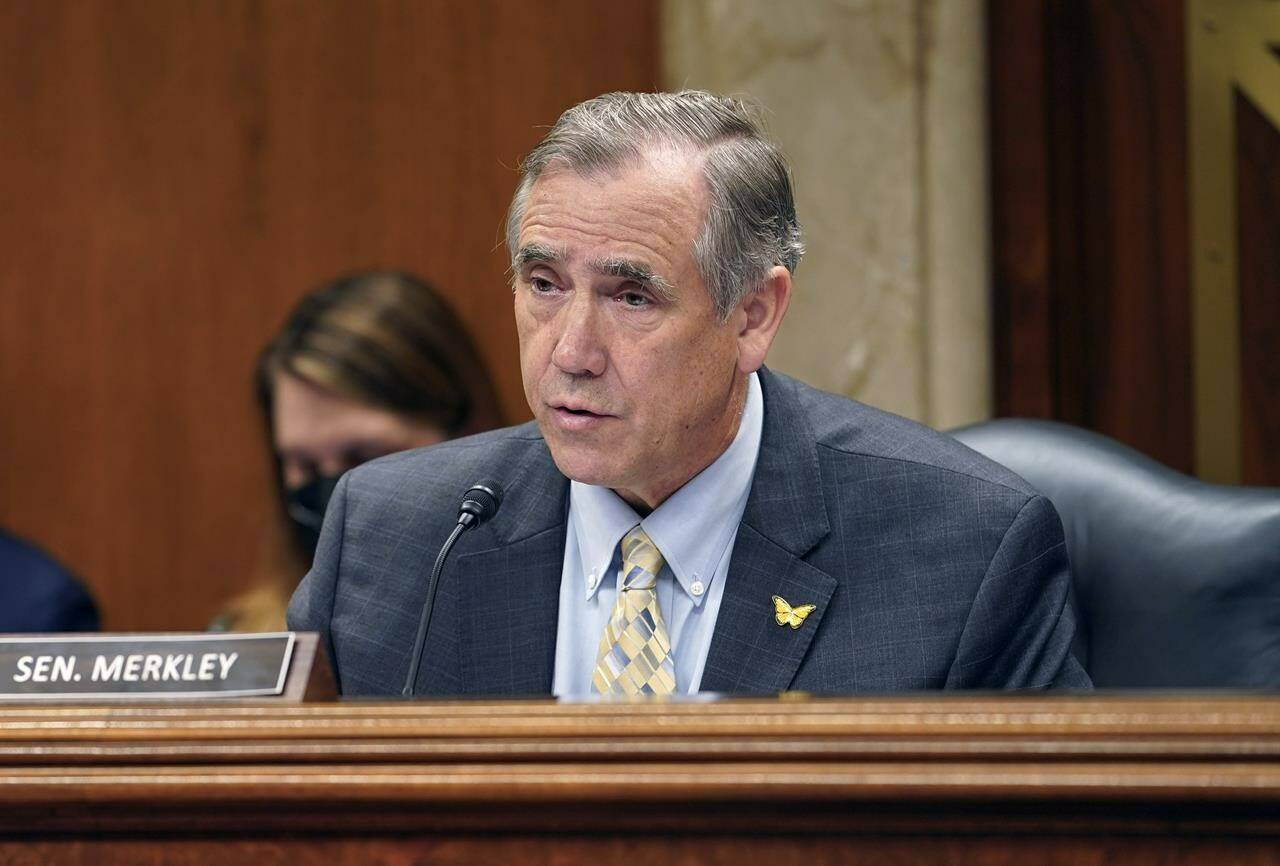Retailers, industry activists and U.S. lawmakers are making one last push to ease federal financing restrictions on America’s burgeoning cannabis industry before midterm elections that could reshape the political landscape on Capitol Hill.
Members of the National Cannabis Industry Association just wrapped up two days of lobbying on behalf of the SAFE Banking Act, legislation that would provide cannabis companies long-sought access to federally regulated financial services.
Without it, firms operating legally in nearly every state in the union will have to continue operating on a cash-only basis, a recipe for money laundering, tax fraud, assault and robbery, said Oregon Democrat Sen. Jeff Merkley.
“Why would you have this cash economy and not enable these legitimate businesses under the state laws spread all across our country to operate within the banking system?” Merkley, a co-sponsor of the bill, asked at a news conference.
“This is not what we Americans want. We want a safe environment, we want a regulated environment and we want certainly to bring this industry into the modern age.”
Merkley told the story of how he and fellow Oregon Democrat Rep. Earl Blumenauer had to help a cannabis executive from their state pay his company’s quarterly tax instalment, which he did with a backpack stuffed with $70,000 in cash.
“This is just an absurdity,” he said. “You’d read this in some novel or some movie about a strange dystopian society, not a modern economy where medicinal and recreational cannabis are very important elements.”
Merkley was joined at Wednesday’s news conference by Rep. Ed Perlmutter, a fellow Democrat from Colorado, which joined Washington as the first states to legalize recreational pot in 2012.
Back then, “We had what I called the chuckle factor — ‘Oh, you’re from Colorado, you’re a mile high,’” Perlmutter said.
Since then, though, the world has come to understand the increasingly high stakes in a multibillion-dollar industry that’s expected to grow significantly in coming years. Estimates vary, but Perlmutter said it’s going to be a US$25-billion business this year, and could grow to $47 billion by 2026.
And he had his own story about boatloads of bills: a friend who sold a building to a local cannabis dispensary in Colorado for $1.7 million — in cash.
“How much does a million dollars in $100 bills weigh? Seventeen pounds,” Perlmutter said.
“It obviously is a public safety issue, it is a tax issue, it is an issue of civil justice, so we can get this done. We will get this done.”
Canadian operators as well are keen to see the U.S. take cannabis reform seriously.
Omar Khan, senior vice-president of corporate and public affairs for Calgary-based retailer High Tide Inc., was part of the delegation meeting with Senate and House officials from both sides of the political aisle.
“Based on those discussions, I am cautiously optimistic that some form of SAFE could pass during the lame-duck session of Congress in November,” said Khan, whose company has operations in Canada, the U.S. and Europe.
Khan said discussions are taking place about adding social equity components to the bill, acknowledging that cannabis prohibition has disproportionately affected people of colour in the U.S.
He said he also advocated for allowing producers, so-called “plant-touching” operations, to be listed on U.S. securities exchanges — a step that would allow a Nasdaq-listed retailer like High Tide “to move into the brick-and-mortar retail space in the U.S.” without risking its listing.
The SAFE Banking Act is just one of several pieces of legislation that have been introduced in Congress this year in an effort to light a fire under the long-standing push to eliminate federal roadblocks to legal cannabis.
In April, the House of Representatives passed Rep. Jerry Nadler’s Marijuana Opportunity Reinvestment and Expungement Act, which would effectively remove cannabis from the U.S. list of controlled substances — the main reason companies so often run afoul of federal rules.
It’s the second time the House has passed the bill, known as the MORE Act. Its prospects in the Senate, however, are decidedly less certain, to say nothing of what Congress might look like after November’s midterm elections.
Senate Majority Leader Chuck Schumer, meanwhile, currently the most powerful Democrat in the upper chamber, has already introduced a comprehensive decriminalization bill of his own: the Cannabis Administration and Opportunity Act.
Industry advocates, though they support the comprehensive approach, are putting their shoulders behind the SAFE Banking Act, a more incremental step but one with more bipartisan support in the current Congress than either the Nadler or Schumer bill.
The SAFE Banking Act currently has more than the 60 votes in the Senate that would be required to get it sent to the president’s desk, said Aaron Smith, the cannabis industry association’s chief executive.
“We know right now, if SAFE were to come up, it would be a 65 to 70 vote,” Smith said. “NCIA is completely supportive of comprehensive reform … but we know the votes are there for SAFE, so our focus is on getting SAFE over the finish line.”
– James McCarten, The Canadian Press

